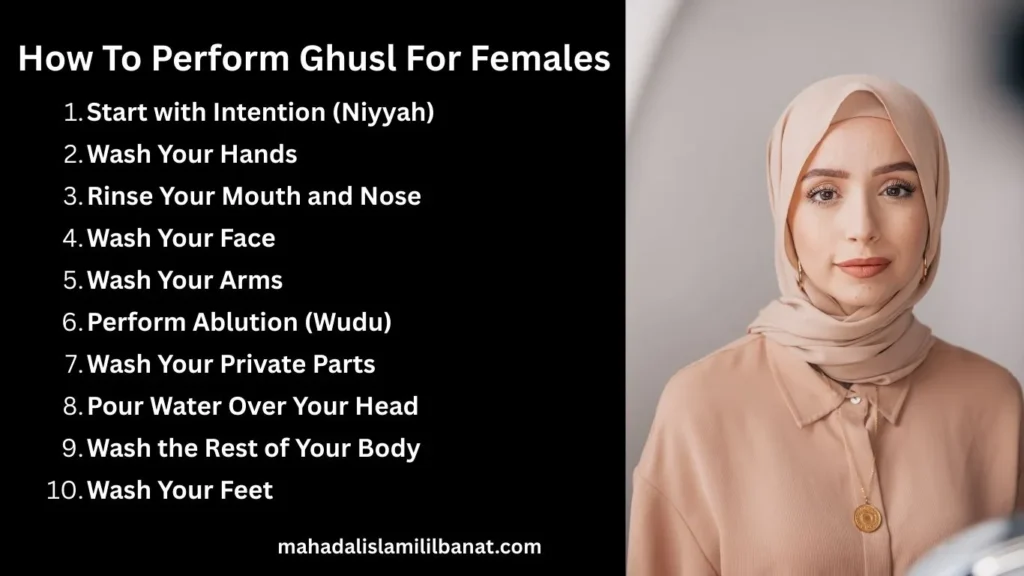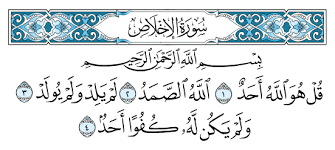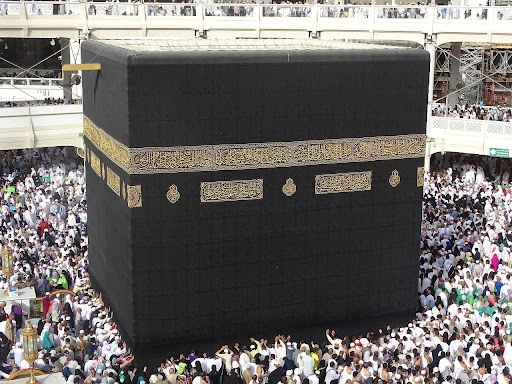A Step-by-Step Guide on How to Perform Ghusl for Females
Ghusl or ritual purification is a necessary act in Islam to ensure physical and spiritual cleanliness. Knowing how to perform ghusl for females is necessary when it becomes obligatory after converting to Islam, sexual intercourse, postpartum bleeding (nifas), and menstruation. The ritual purification is simple and has the correct intention.
You need to consider the internal intention rather than verbal niyyah to purify yourself for the sake of Allah Almighty. An easy ghusl guide for ladies in Islam encourages you to wash your hands and private parts to remove the physical impurities. Now, you will perform the full wudu (ablution) just like before the prayer. After that, water must be poured over the whole body, beginning from the head to the hair and skin.
You must make sure that no body part is left dry, including areas which are not easy to reach, such as behind the ears and under the nails. The women with braided hair don’t need to undo the braid unless water can’t reach the scalp. Ghusl for women allows you to restore your ritual purity while going through the spiritual renewal. At the online Quran academy, we teach female students regarding different crucial matters.

What is Ghusl?
The term Ghusl derives from the Arabic word meaning “to cleanse” or “to wash.” It refers to the entire ritual bath or ablution needed for purification after the major impurities, such as Janabah, allowing you to get ready to worship Allah Almighty.
The Janabah concept can raise many questions for several women, including newlyweds, because it provides abundant information while focusing on different religious practices. Understanding such matters is important for women looking to follow religious principles. You can enroll in an Islamic education course to learn everything about ghusl for women.
A Step-by-Step Ghusl Guide for Women in Islam
There is a comprehensive guide on how to perform ghusl for females. You need to consider the essential steps for ladies to purify, especially after different types of impurities such as janabah and menstruation. Let’s follow these rules of ghusl for females in Islamic teachings.
Start with Intention
You can begin niyyah to perform ghusl for physical and spiritual purification. It is their first step in how to perform ghusl for females after menstruation. This step allows you to make a clear intention to start the ghusl.
Wash Your Hands
The second step for women’s ghusl is to wash your hands three times. This step allows you to ensure ideal cleanliness through the removal of the physical impurities.
Rinse Your Mouth and Nose
It is necessary for Quran reciters to rinse their nose and mouth three times during the ghusl process. You must make sure that both parts of your body are thoroughly cleansed.
Wash Your Face
It’s time to wash your while face three times to remove the impurities. You need to ensure that water reaches from one ear to the other and from the forehead to the chin because it is a necessary step in how to perform ghusl for females.
Wash Your Arms
In this step of the Islamic way of performing ghusl for females, you have to cleanse your arms three times. You can clean your arm with water from the right, top, and around the elbows.
Perform Wudu
You need to make ablution just like you perform for the salah. However, you can delay washing your feet till the end of ghusl. Quran teachers can also guide you through the wudu process during purification.
Wash Your Private Parts
It is crucial to clean the private parts of your body. You must make sure to remove the impurities in this essential step of ghusl for women. This step is necessary in the ghusl procedure for Muslim women after sexual activity.
Pour Water Over Your Head
You need to pour water three times over your head. It’s essential to ensure that water reaches your hair roots while covering your scalp. It is also a complete ghusl method for women with braids.
Wash the Rest of Your Body
Now, you have to wash the rest of your body. You can start with your body from the right side to the left. It is necessary to pour water into each body part, including under the arms.
Wash Your Feet
Washing your feet is the last step in how to perform ghusl for females. You can start with the right foot and then wash the left foot. It is crucial to make sure that water cleanses between the toes of your feet. After ghusl, you can perform Tahajjud prayer and other prayers.
When Ghusl is Farz for Females?
It is important to understand the ghusl steps for ladies when it becomes necessary in specific conditions. Ghusl is obligatory in the following situations:
- After a state of sexual impurity (janabah)
- After the end of postpartum bleeding or menstruation.
- Discharge is found after a wet dream.
Hazrat Umm Salamah (RA) reported that Umm Sulaim (RA) asked the Holy Prophet Muhammad, “Is it obligatory for a woman to perform ghusl if she has a wet dream?” The Prophet ﷺ replied, “Yes, if she sees the fluid.” [Bukhari and Muslim]
You must note that ghusl is not necessary if the vaginal sicharge is natural. Moreover, you don’t need a ghusl if there is no discharge after the wet dream. After ghusl, you can touch the holy book and count how many pages in Quran.
How to Take Ghusl Bath for Women after Periods
It is important to explore how Muslim women purify themselves after menstruation through a ritual bath, which is known as a ghusl. Women need to make a clear intention (niyyah) to purify themselves. Now, they have to wash their hands (three times) and their private parts.
It’s time to make the ablution and pour water over the head three times before washing the entire body, starting from the right side to the left. This is how to perform ghusl after haidh for females in Islam.
Importance of Performing Ghusl for Females
“O Believers! If you are in a state of major impurity [that requires ritual bath], then purify yourselves.”
{وَإِنْ كُنْتُمْ جُنُباً فَاطَّهَّرُوا}
Surah Al-Ma’idah (6:5)
Ghusl is a crucial aspect of Muslims’ faith and worship, emphasizing the significance of cleanliness and purification. You need to perform ghusl after janabah before reciting the hily book, including the last two ayat of Surah Baqarah. The fundamental purpose of hw to perform ghusl for females is to physically cleanse oneself, fulfilling the spiritual obligations.
There are different hadiths that highlight the importance of ghusl in Islam. Hazrat Aisha (RA) reported that Hazrat Asma (RA) asked about the Ghusl after monthly periods. The Holy Prophet Muhammad (PBUH) said:
“Let one of you take her water and lotus leaves to cleanse herself thoroughly. Then pour water over her head and rub it vigorously to ensure it reaches the roots of her hair. After that, she should pour water over herself and use a piece of cloth scented with musk for purification.”
Hazrat Asma (RA) asked how women can perform Ghusal, the Holy Prophet (PBUH) replied, “SubhanAllah, purify yourself with it!” Hazrat Aisha (RA) whispered to Hazrat Asma (RA) to purify the body parts where blood flowed. Moreover, women can learn Quran after purifying themselves of major impurities.
Later, Hazrat Ama (RA) asked about the ghusl after the sexual impurity, and Hazrat Muhammad (PBUH) responded: “Let her take water and cleanse herself well, then pour water over her head and rub it so it reaches the roots of her hair, followed by pouring water over herself.”
The Reflection of Islamic Teachings on Ghusl for Women
The Islamic teachings emphasize the ghusl and reflect the responsibilities and rights. Proper ghusl allows you to maintain dignity and fairness. It also leads to the spiritual, emotional, and physical well-being of women. Islam encourages women to understand the religious teachings, including how to perform ghusl for females.
Hazrat Aisha (RA) narrated, “The best of women are the women of the Ansaar! They do not allow shyness to prevent them from understanding their religion properly.” [Muslim] So, women can perform ghusl before starting the best Quran memorization course.
When is Ghusl Recommended?
There are different conditions when performing ghusl, which is not obligatory but recommended, following the Sunnah. Let’s discuss the conditions when you can perform the ghusl for your spiritual and physical purity.
- Joining Social or Religious Gatherings: You can perform the ghusl when attending different gatherings such as Eid celebrations, rain prayers, or weddings.
- On Friday: Performing ghusl on Friday is encouraged because it improves the spiritual readiness and cleanliness.
- Before Specific Worship Acts: You can make the ghusl before entering the Ihram, which is the starting point of a special ritual for Umrah or Hajj.
- For the Deceased: Islam recommends performing ghusl for deceased persons, making sure they have gon through purification before the funeral and burial.
- After Fiving Ghusl to the Deceased: The Muslims can perform ghusl after giving ghusl to the deceased to maintain their own purity.
- Reverting to Islam: When a person reverts to Islam, it is recommended to perform ghusl and embrace the faith before reading basic Noorani Qaida.
It is important to understand how to perform ghusl for females, ensuring physical and spiritual cleanliness. Our experienced instructors at Mahad Al Islami Lil Banat offer a structured curriculum covering different topics, including memorization, Tafsir, and Tajweed.
Conclusion
Understanding how to make ghusl for ladies is necessary to fulfill the spiritual obligations and maintain cleanliness. You can follow the essential ghusl steps for women to ensure purification and engage in different worship acts with devotion. It is important to note that purification has prominent importance in the faith. These practices help us in the spiritual journey through the intention and knowledge..
FAQ
Answer: You can start with intention, wash hands, private parts, make ablution, and wash the whole body.
Answer: An obstacle that restricts water from reaching a part of the body invalidates the ghusl for women.
Answer: You can perform ghusl in the shower following the essential steps.
Answer: Yes, a woman has to wash her hair for ghusl after a period.
Answer: Ghusl is farz for women after sexual intercourse, childbirth, and menstruation.
Answer: No, you cannot pray without ghusl. You have to do tayammum to pray if there is no water for ghusl.








